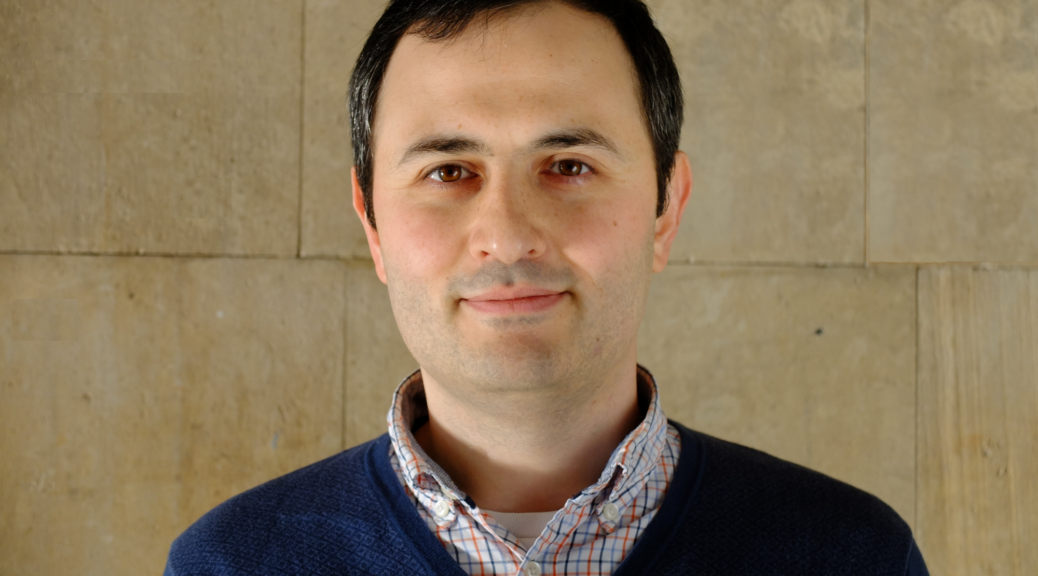Vahagn Jerbashian, our graduate on the PhD in Economics program, has been working as an Assistant Professor at the University of Barcelona since 2013. In this interview, he shares his journey from theoretical mathematics to economics, his current research interests that lie in technological change and innovation, competition, human capital accumulation, and economic growth; and his activities for the Armenian Economic Association.
You studied mathematics before coming to CERGE-EI. Why did you choose economics for your PhD studies?
This has brought back many fun memories from my studies at CERGE-EI, about a lot of sleepless nights spent on course work and dissertation chapters. Of course, these memories also include occasional bicycle trips, beer parties, friends and former classmates, and a few parks and benches I used to like visiting in the early mornings in beautiful Prague. All this was a very rewarding experience.

Indeed, I studied theoretical mathematics in Yerevan, Armenia, before coming to CERGE-EI. Theoretical mathematics is fascinating, and I would say it is the most fundamental science. However, a career path in theoretical mathematics is very challenging since it has few applications and the demand for it tends to be low. I decided to make a shift and study a more applied science at the end of my undergraduate studies. I took classes in statistics, actuarial mathematics, financial mathematics, and programming during my graduate studies in math. I soon realized that I was not really into programming because I had a feeling that if I continued on that route, I would become a (modern) type of engineer who solves a lot of small tasks for building digital infrastructure. I liked actuarial and financial mathematics but felt that something was missing there. They either lacked or had very rudimentary behavioral choice models.
I was looking into study abroad programs at the end of my undergraduate studies and wanted to learn more about the existing opportunities. I went to an education fair and bumped into Gurgen Aslanyan, who was a student at CERGE-EI at that point in time, and was presenting programs at CERGE-EI at the fair. His words that economics is an interesting and challenging field were met with my skepticism. He managed to spark an interest in me by showing a working paper from CERGE-EI with lots of formulas in it. I would not know what those formulas exactly meant at that point in time, of course, but I got interested and started thinking that economics might be an interesting avenue for my further studies.

I was lucky to get admitted to prep semester at CERGE-EI in the summer of 2007. I really liked the intensity of the curriculum and the amount of concentration on studies that it required. Our professors also managed to convince me that economics is a fascinating subject with tons of interesting questions. At that point, I felt that economics is a lot like physics but much more interesting in the sense that it tries to explain the behavior of people, firms, and the results of their interactions, instead of atoms and stars. I was also very lucky that in the same year CERGE-EI hired my future advisor, Evangelia Vourvachaki.
I remember very well one of our beer parties in the Fall of 2007. Evangelia told me about some parts of her research during this party. It was about the impact of information and communication technologies (ICT) on growth in a multi-sector economy. This was one of the most important moments for my decision to immerse myself in economics and my selection of the research field. Before this discussion, I did not know that economics is such a broad science and asks questions like these!
How has your CERGE-EI experience helped you in your choice of career in academia?
I like working a lot. I value independence in my work and critical, open, and direct feedback. I also like learning and teaching. I enjoyed all of this during my PhD studies in Prague. I learned a lot from my advisor, as well as other professors and my friends and colleagues. I enjoyed attending the seminars during my PhD studies at CERGE-EI and listening to sometimes very heated academic debates. I assisted in teaching many courses at CERGE-EI and taught in a few universities in Prague and Brno. All this naturally led me to choose to continue my career in academia. I joined the Department of Economic Theory at the University of Barcelona as an Assistant Professor after my PhD studies in Prague in 2013.
Why did you decide to join the University of Barcelona?
I was very happy to receive a job offer from the University of Barcelona after the job market. There were at least a few reasons why I accepted it. Perhaps among the most important reasons was that I had a feeling that the department was very vibrant and friendly during my job-talk visit. This feeling has proven itself correct. I knew that the members of the department work on very interesting topics and that academia in Barcelona is very vibrant in general. I have grown professionally and developed exciting research lines being in this department. I also felt closer to home in Barcelona.
In your research, you focus on the effects of information and communication technologies on the economy, among other topics. What are your recent findings in this area? What projects are you working on currently?
I like pursuing a relatively broad set of research topics. Perhaps, another fascinating feature of economics is that it makes this possible.
My research focuses on issues related to technological change and innovation, competition, human capital accumulation, and economic growth. For example, in one of my papers, I show that the fall in prices of information technologies has affected the demand for occupations in industries in European countries. It has reduced the demand for medium‐wage occupations and increased the demand for high-wage occupations. Interestingly, these effects are much stronger for females than males. The fall in prices of information technologies has increased the employment of females in high-wage occupations and reduced their employment in medium-wage occupations more than the employment of males in these occupation groups. In a recent small extension, I show that some part of the fall in prices of information technologies can be attributed to trade in information technologies with China. This evidence identifies a new way how trade affects labor demand in general.
A very recent project of mine investigates the behavior of firms during an epidemic. This project is very much motivated by the current situation in the world. It shows that firms have incentives to fight against infections among their employees by allocating employees to remote work and rotating them. The fight against infections in firms can significantly affect the dynamics of the epidemic and reduce infections and death rate. It can also soften the negative economic shock because of the epidemic. From a policy perspective, it shows that subsidies for sick leave reduce the cost of sick workers and raise workplace and aggregate infections. Furlough policies are successful in reducing infections and saving lives. Firms delay and weaken the fight against infections during economic downturns.
You are a board member of the Armenian Economic Association. Tell us more about your work there.
Currently, the main activities of the association include the organization of a yearly conference and various workshops on economics topics. For example, this year we organized a special workshop about COVID-19 during our annual conference and invited many policymakers from Armenia to join. We also presented the results of a survey we carried out among Armenian professionals and economists about the potential effects of COVID-19 in the Armenian economy and the best feasible policies for alleviating these effects.
I have been part of this association for about 10 years now. I have always wanted to contribute to the development of economics scholarship in Armenia and this is one of the ways I have tried to make myself available and, perhaps, useful.
What are your next professional plans?
I suppose, this question has a very short answer: continue working and growing in all directions and get my work published.

Dear Vahagn,
I never knew that the working paper I showed you was that important in your life. Interesting enough, 15 years later, I remember which one it was. Here it comes: http://www.cerge-ei.cz/pdf/wp/Wp243.pdf